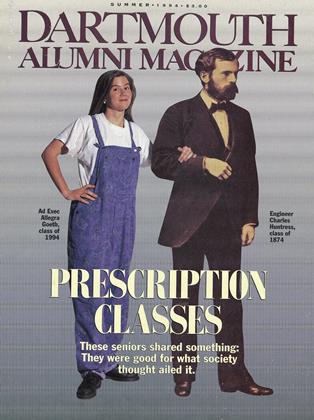Back on campus in June of 1994 to celebrate the 50th anniversary of our Commencement that never was, the class of 1944 was rained out of leading this year's Commencement procession across the Green. Instead, we marched to our seats slightly behind the speakers' platform set up in Thompson Arena. Our class had first come to Dartmouth in troubled times. Millions were warring in Europe and Asia as we matriculated. Earl Harbor, late in the first term of our sophomore year, changed all of our lives forever. We signed up almost overnight, and almost to a man. Our career choices were quite simple: walk, float, or fly; boots, boats, or wings.
Only a handful left cam-pus before June 1942. The College's first Navy Air Corps squadron was called up that month, and a steady campus exodus began. Farewell parties vied with Tower Room time as friends went off to basic or boot camp or OCS. And where were S quantum and Camp Pendleton and Fort Bragg? Where, suddenly, were your buddies? Oz, Twitch, Blue Duck, Needle, and Slippery Willy? Gone, like innocence.
Those of us who didn't get our orders wondered when we would trade in our blue books for the wild blue yonder. We waited. The College shifted to year-round operation, and we discovered the joy of a Dartmouth summer: sunbathing, softball on the Green, skinny-dipping in the Ompompanoosuc, and canoeing on the Connecticut.
But those days were incongruous and uneven, jumpy and blurred. Town and gown took on a new dimension when John Rand, DOC director and sudden air-raid warden, blacked out Baker Library while Main Street kept its lights blazing. Professors and administrators departed in step with the student body. History professor Al Foley was suddenly teaching physics as well as "Cowboys and Indians" and was either a chapter ahead of or behind the class, depending on the weather. A retired banker from Boston was brought in to teach eccy 1, but kept drawing the graphs upside-down on the blackboard.
There were days of uncertainty and futility. The headlines were geography lessons: Murmansk, Crete, Wake, Anzio. Studying was tough. Shakespeare and calculus competed with Kiska and Tobruk. Those campus times may not have tried our souls, but they did try our youth and its sensitivities.
We went off with flags flying in 1942-43; sadly, for too many it was flags at half-mast when we came back in 1945-46. There are 310 names on the Dartmouth war memorial in the Hopkins Center courtyard, 23 of them members of the class of 1944.
Commencement had been a dim concept 50 and more years ago and few of us really grieved that we weren't in Hanover in June 1944 to don caps and gowns. Now, five decades later, as we watched another generation of students celebrate their graduation, President Freedman announced that Dartmouth College wished to give recognition and appreciation to the class of 1944 "for a half-century of patience, forebearance, loyalty, and support." He called upon the Class of '94 to stand and recognize the Class of '44. Astanding ovation erupted from the graduating class and spread throughout the arena. We were moved beyond any saying. Tears flowed freely. We had expected a reunion, but we got so much more. After 50 years, we had truly come home.
 View Full Issue
View Full Issue
More From This Issue
-
 Feature
FeatureThe Onlyness of a Long-Distance Runner
June 1994 By Robert Sullivan '75 -
 Cover Story
Cover StoryWhat To Learn From Logs
June 1994 By David O. Hooke '84 -
 Article
ArticlePrescription Classes
June 1994 By David Sobie '94 and Kai Singer '95 -
 Article
ArticleDr. Wheelock's Journal
June 1994 By "E. Wheelock" -
 Article
ArticleFilling The Power Vacuum
June 1994 By Karen Endicott -
 Class Notes
Class Notes1973
June 1994 By Donna Ferretti Tihalas
Fritz Hier '44
-
 Letters to the Editor
Letters to the EditorWebster and Wright
OCTOBER 1998 -
 Article
ArticleNAME, RANK, AND SERIAL NUMBER.
DECEMBER 1969 By FRITZ HIER '44 -
 Article
ArticleThe Yusens' Wild-blue Yonder
March 1977 By FRITZ HIER '44 -
 Cover Story
Cover StoryDartmouth on Mt. Everest
MAY 1983 By Fritz Hier '44 -
 Feature
FeatureDingwall of Dartmouth
SEPTEMBER 1985 By Fritz Hier '44 -
 Article
ArticleDartmouth's Oldest Living All-American Football Star
APRIL 1990 By Fritz Hier '44







